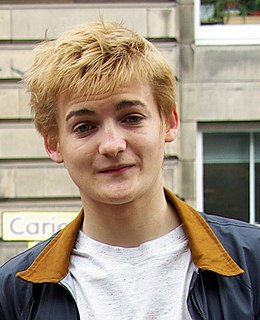A Quote by Edward Hirsch
My focus is on the reader and that the poet's job is not to inspire himself or herself. The poet's job is to inspire some future reader.
Related Quotes
Another trouble with poetry - and I'm gonna stop the list at two - is the presence of presumptuousness in poetry, the sense you get in a poem that the poet takes for granted an interest on the reader's part in the poet's autobiographical life, in the poet's memories, problems, difficulties and even minor perceptions.
Every reader, as he reads, is actually the reader of himself. The writer's work is only a kind of optical instrument he provides the reader so he can discern what he might never have seen in himself without this book. The reader's recognition in himself of what the book says is the proof of the book's truth.
I want each poem to be ambiguous enough that its meaning can shift, depending on the reader's own frame of reference, and depending on the reader's mood. That's why negative capability matters; if the poet stops short of fully controlling each poem's meaning, the reader can make the poem his or her own.
A trouble with poetry is the presence of presumptuousness in poetry, the sense you get in a poem that the poet takes for granted an interest on the reader's part in the poet's autobiographical life, in the poet's memories, problems, difficulties and even minor perceptions. I try to presume that no one is interested in me. And I think experience bears that out. No one's interested in the experiences of a stranger - let's put it that way. And then you have difficulty combined with presumptuousness, which is the most dire trouble with poetry.





































